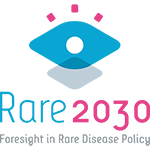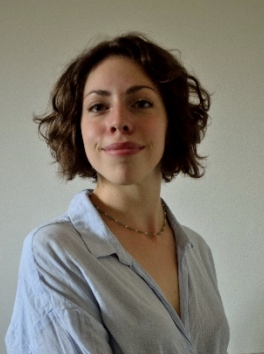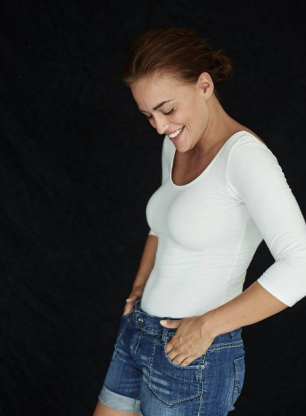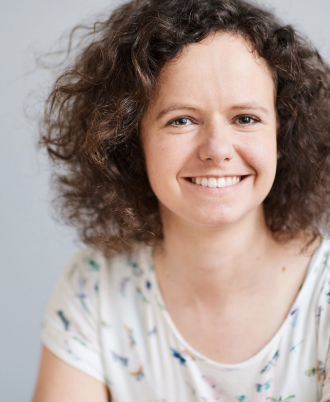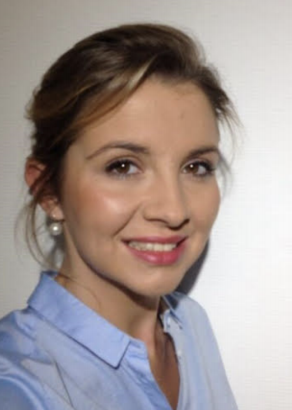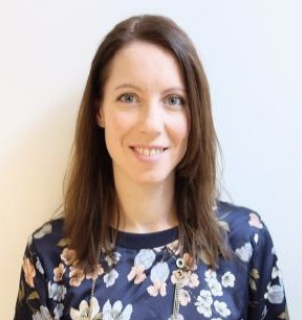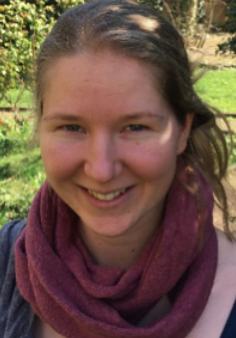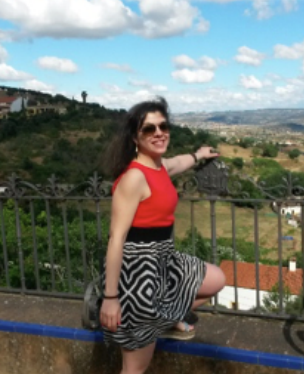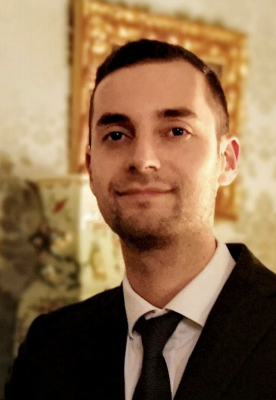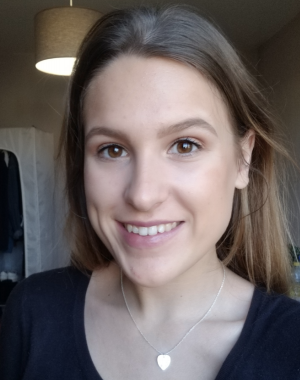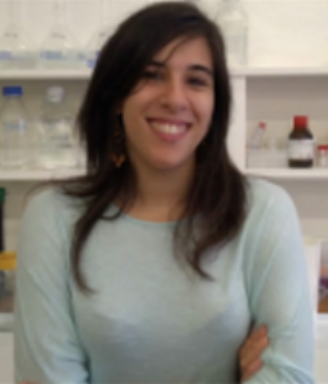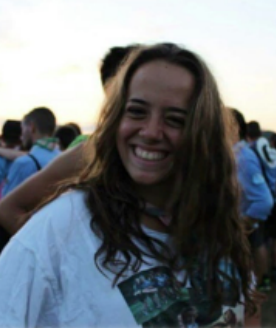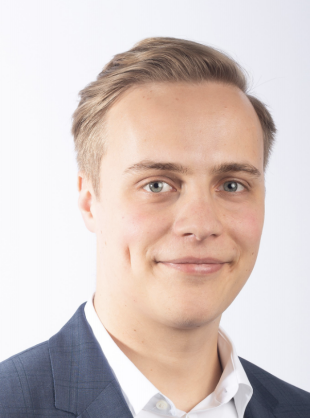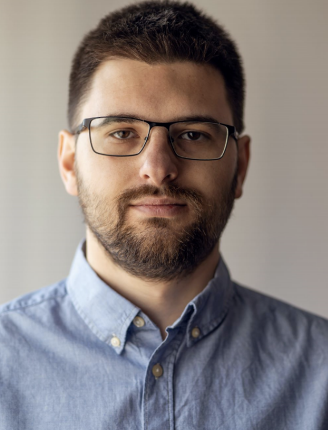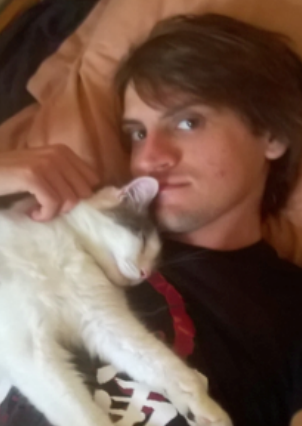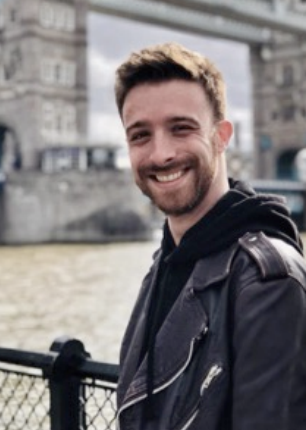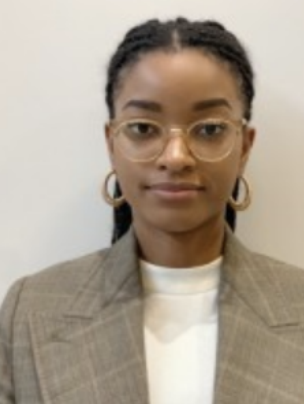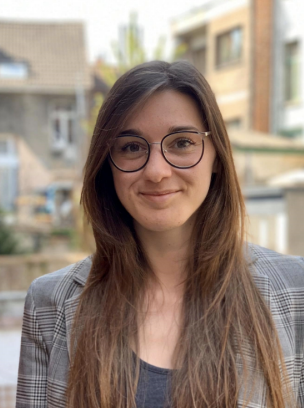Young Citizens
Meet our selection of young and motivated citizens from 12 European countries to contribute to the future of rare disease policy. They are studying to become doctors and researchers, they are health advocates or policy makers, they are living with a rare disease themselves or care for the ones in need. Hear what they say about themselves and why they have decided to join the Rare2030 project!
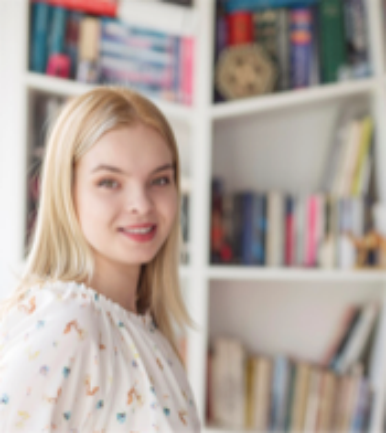 AMINA BERBIĆ, project and financial manager, Bosia and Herzegovina
AMINA BERBIĆ, project and financial manager, Bosia and Herzegovina
“My name is Amina Berbić. I come from Bosnia and Herzegovina. I am 24. I was born with VSD and ASD. At age of 17, I was diagnosed with pulmonary hypertension due to late repaired of large VSD. As young teenager, I straggled with my disease because I was not “normal” as other teenagers. I tried to avoid talking about my symptoms and disease because I had feeling that I am not sick if I am not talking about it. I have a rare disease thus it was difficult to find other young patients to relate with them. When I managed to find two beautiful girls which gave me strength to fight for my dreams and inspire other patients to do same thing. In that moment I knew that I will do everything I want, not letting my disease define me. What I wanted to say is that I don’t want my disease and struggle to make me a victim. I want my battle to make me someone else’s hero. Most of my goals come true; I finished my bachelor degree in international finance and master degree in business administration. Also, I learned different art techniques such as oil painting, decoupage technique painting, silk painting, ebru, calligraphy, aluminium foil painting and I started to grow and foster organic food. I keep going and discovering new things. I support and inspire young patients to do same thing within PH Serbia organization, to follow their dreams and achieve their goals. I am working as project manager and financial manager at local women organization called Mosaic of culture and traditions, where I have implemented more than 10 projects and still working on expanding my project portfolio. I want to maximize my leadership potentials in order to success in my goal to create organization for young patients with pulmonary hypertension in B&H. I would like to learn more about ways to help patients to make decisions about their health care and get financial, legal and social support.”
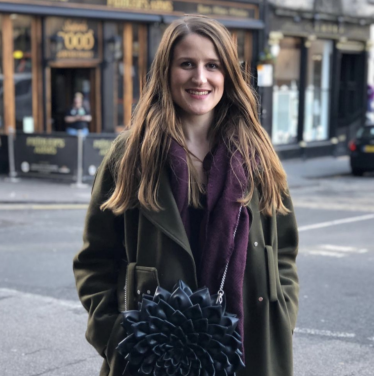 ANA BEGIC, senior regulatory affairs officer, UK
ANA BEGIC, senior regulatory affairs officer, UK
“My name is Ana Begic. I’ve earned my Master of Pharmacy degree from Faculty of Pharmacy and Biochemistry, University of Zagreb (Croatia) in 2013. Following completion of MPharm I enrolled in Postgraduate specialist study Molecular diagnostics to widen my knowledge in pharmacogenomics, personalised medicine and the way human genomics is reshaping our approach to therapy and diagnosis. I am also finalising a Postgraduate specialist study Leadership & Management of Health Services (Faculty of Medicine, University of Zagreb) which was primarily focused on scientific knowledge in the field of health systems and services and their application in clinical management of patient and disease management in accordance with the principles of evidence-based medicine. After working as a pharmacist in a community pharmacy for 3 years, I have joined European Medicines Agency in London as a trainee and a Procedure Manager in Human Medicines Evaluation, Procedure Management Department. I currently work as a Global Regulatory Affairs Officer in a Contract Research Organization committed to identifying, understanding and addressing unmet public health needs. I want to use my knowledge, enthusiasm and passion to help rare diseases patients together with people who have the power to make a difference.”
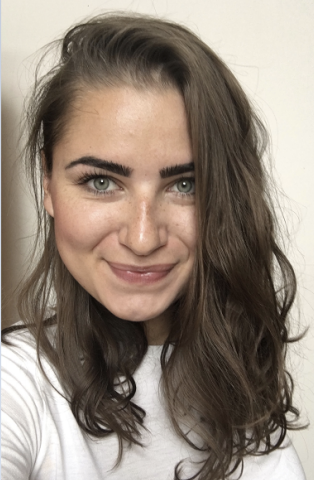 ANETA MORKOVSKA, doctor, Czechia
ANETA MORKOVSKA, doctor, Czechia
“My name is Aneta Morkovska and I am 27 years old. I come from Czechia and I currently live in Prague. I have a rare disease, diagnose is called MRKH – MayerRokitansky-Kuster-Hauser syndrome, which is congenital aplasia of vagina and total agenesis of uterus. I had to undergo number of operations to have functional vagina. I basically do not experience serious health issues since that, but social and psychological impact is significant. About 2 or 3 years ago I decided to change my attitude and I joined the Czech Association for Rare Diseases as a first women with my diagnose and started to talk about it publicly. Czech Association for Rare Diseases helped me to spread awareness about the condition since then. I gave an interview to a countrywide magazine and to national radio station thank to them. I also try to educate medicine students and I make a presentation for them about my syndrome. I founded supporting group – including website and Facebook page – to connect women with the MRKH syndrome in my country. I usually meet with young girls/women or their relatives and tell them what to expect, how to deal with the condition itself and basically encourage them. In my personal life I finished university last year and I work as a doctor in Motol University Hospital in Prague and live with my boyfriend.”
CATERINA DALLAI, psychology student, Italy
My name is Caterina Dallai, I’m 22 and I’ve a bachelor’s degree in psychology (earned at the University of Padova). At the moment I’m in a gap year between my degree and the beginning of a master, in social psychology. This year I’m a scoutmaster with kids from 8 to 12 years, and I’ve worked with kids (12-16 years), who have learning disabilities, to help them with homework. I’ve spent all the month of February in Bethlem volunteering at a school for hearing impaired children and teenagers. For two years, when I was in Padova, I volunteered as a hospital clown with a local organization (Dottor Clown). I’ve many hobby, such as playing guitar, taking photos and anything related to craft works (drawing, sewing and recycle item). In September I’ll begin a master degree in social psychology, specifically the study course I’m interested about, study the communities and the promotion of well-being and social change.”
DANIELLE DRACHMANN, executive director, Denmark
My name is Danielle Drachmann. After giving birth to two children with idiopathic ketotic hypoglycemia (IKH) I took a Master in Anthropology of Health to support my passion for patient advocacy. Idiopathic ketotic hypoglycemia is a frequent cause of childhood hypoglycemia that is often underdiagnosed and undertreated. I founded the global organization Ketotic Hypoglycemia International (KHI) to foster the advancement of research into its etiology, prevalence, and treatment. From the very beginning parents and patients worked closely with the Scientific Advisory Board on various patient-initiated (research/publications) projects, based upon novel observations in the organization. Our work is an example of how a patient organization and medical experts can work together, connecting family representatives and experts from around the world. As the Executive Director of KHI, my work spans wide. From working on research protocols, medical publications, children’s books, conveying research, coordinating conferences, fundraising, support patients in person and virtually, uniting the right experts around the different projects, approaching policy issues to establish and maintain the collaboration between pharma, biotech and IKH experts centralized around the patients in KHI.
DOROTHEA DALIG, consultant in public affairs, Belgium
My name is Dorothea Dalig. I studied psychology, Jewish studies, literature and pharmacy at the University of Freiburg, Germany. I graduated with a degree in psychology and pharmacy. I was actively involved in several form of students’ representation and advocacy at faculty, national and international level focusing on access to education, students’ participation, mobility and interdisciplinary approaches. 2017, I moved to Brussels to serve as Vice President of European Affairs for the European Pharmaceutical Students’ Association (EPSA) and to work as a policy trainee for the Pharmaceutical Group of the European Union (PGEU). Since 2019, I work as a consultant for the public affairs agency Interel while practicing as a community pharmacist from time to time. My mother tongue is German, I am fluent in English and have a good command of French.”
ELEONORE MATHE, pharmacy doctor, UK
My name is Eleonore Mathe. French Doctor of Pharmacy, I chose to specialize in Regulatory Affairs after a first experience at Sanofi Pasteur, working on the Regulatory aspects of WHO/PAHO tenders for vaccines for Latin America, which also confirmed my interest in Public Health. After graduating from my International Drug Development and Registration MSc at Paris Sud University, I moved to London to join GlaxoSmithKline where I had the opportunity to work at a global level in several therapeutic areas (Respiratory, HIV, Oncology, Rare Diseases). I then pursued my path at Spark Therapeutics to work in the development of gene therapies for Rare Diseases. These promising therapies being innovative, the regulatory landscape in this area has to adapt quickly. I feel strongly engaged in making the framework evolve and more supportive in order to facilitate patient access to innovative therapies.”
ELSA COULOMB, pharmacist, France
My name is Elsa Coulomb and I am a French pharmacist. I decided to involve myself because I am afflicted by a rare disease. It is quite new, so I am still discovering what it to live with is. For now, I realize challenges that may be encountered, and I clearly realize that could be improved. So I want to become active in that way.”
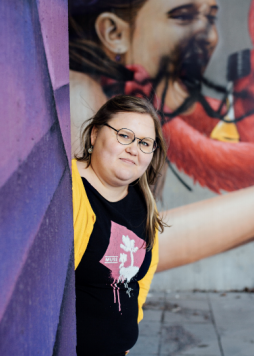 FANNI-LAURA MÄNTYLÄ, patient advocate, Finland
FANNI-LAURA MÄNTYLÄ, patient advocate, Finland
“Fanni-Laura Mäntylä is a Mental Health Activist, a Patient Advocate and Mental Health and Substance Abuse Work Professional. Mäntyla was Chair of the 5th Edition of European Health Parliament: Committee on Mental Health and Healthy Workforce.
Speaking openly about her personal experience of work related burnout and young adulthood with severe depression, Mäntylä in her 30s is now an active influencer about mental health in her native country Finland as well as in the EU.
Being a type-1 diabetic, Mäntylä urges for more discussion about health in a holistic manner and calls for all stakeholders together on the agenda. Mäntylä is a strong voice for young people affected by mental ill-health and a living proof that issues with health do not define a person.”
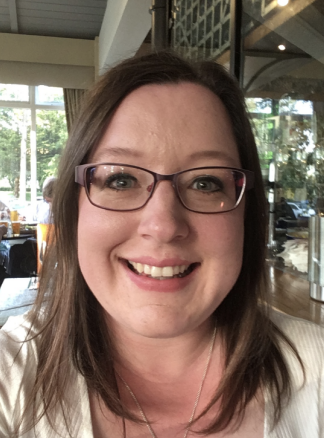 HAYLEY HUBBERSTEY, health economist, UK
HAYLEY HUBBERSTEY, health economist, UK
“My name is Hayley Hubberstey and I am from Wirral in North West UK, near Liverpool. I’m a science geek by background and now work in health economics specialising in understanding the impact of rare diseases to help enable access to new treatments. I have been involved with the rare disease community for about a year and it’s been such a special experience. As part of my current job I’ve have the pleasure to attend and learn from many rare disease events and conferences. I felt instantly welcomed and at home as a professional new to the community. I have made new friendships and have met many inspiring and dedicated people. My education was in pharmaceutical sciences and I obtained my PhD in Biochemistry. I worked at Unilever a global consumer goods company for 5 years. I joined as a laboratory scientist and then worked as a project manager. I gained experience in delivering successful projects whilst working alongside global cross functional teams. I managed these projects from project conception through to product launch. I now work for HCD economics as a real-world evidence manager. We use peer-reviewed methodologies to gather evidence to inform and challenge healthcare policies and to improve patient outcomes. We collaborate with a diverse group of healthcare professionals from academia, charities, patient advocates, clinical specialisms and industry sponsors.”
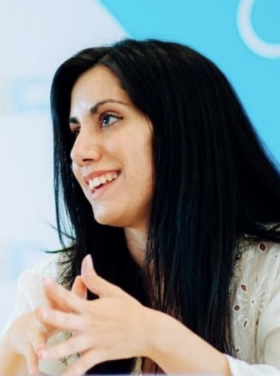 MARIANA COUTINHO, clinical psychology researcher, Portugal
MARIANA COUTINHO, clinical psychology researcher, Portugal
My name is Mariana Coutinho. I have been diagnosed with a rare form of vascular sarcoma with a prevalence of 1 in 1 million and no standard treatment: Epithelioid Hemangioendothelioma (EHE). After being misdiagnosed, I was denied the possibility of accessing the most adequate treatment for me, which couldn’t be provided in my home country. This was the moment when I decided to take my health into my own hands and started self-advocating. I learned about the EU Directive on Cross-Border Healthcare, one of the several legal instruments that allows patients to get access to treatment abroad, and became aware of my rights. Since then, I joined several patient associations where I work as a patient advocate and have had the opportunity to represent cancer patients on several national and European events. Recently I was invited to bring awareness and share my perspective at a roundtable event at the European Parliament where Cross Border Healthcare was discussed. For the last 2 years, I have also been doing volunteer work with children affected by cancer, and recently had the privilege of organising the meeting of a Portuguese MEP to this oncology centre. Additionally, I’m a Clinical Psychology Researcher and focus mainly on chronic illness.”
MARIE BARTH, PhD biochemistry student, Germany
“My name is Marie Barth and I am a PhD Biochemistry student. I have been diagnosed with childhood cancer (Hodgkin Lymphoma). I am involved in various activities regarding childhood cancer: local survivor group, meetings on European level (child hood cancer international, SIOPe).”
ORIANA DE SOUSA, advisory board member, Portugal
“My name is Oriana and against all the odds, I am now a 9-year rare cancer (small cell ovarian cancer hypercalcemic type, aka SCCOHT) survivor due to immunotherapy. I started my journey with cancer in 2011, at age 22, and found that the first response from my providers was one of ignorance and even negligence. However, my obstinate attitude and my parents’ love enabled me to not give up; instead, I started self-advocating. I went through several hospitals in my country and abroad, always focused on finding a cure. After four recurrences, I became, in 2015, the first patient with my type treated with immunotherapy. I achieved total remission and my case let others follow the same path. Our results were encouraging to the research community and we worked together to understand when the good results were a random event or whether it would mean a new treatment option for our type of cancer. After seeing the results of the research, I gathered courage and accepted a New York Times interview. My goal was to not only be able to help more patients advocating for their treatments but also give visibility to my type of cancer and incite the medical community to look more closely for rare cancer patients and search for at immunotherapy and other personalised options. Once I am a Psychologist and, having in mind my personal life story, also feel the need to support emotionally and psychologically others who are dealing with cancer. For that reason, I recently founded a website for online psychological appointments to support cancer patients, survivors and caregivers. I am currently a student of the Patient Expert Course at the European Patients’ Academy On Therapeutic Innovation (EUPATI) and I am Patient Advocate at Network Rare tumors of the Ovary (NRTO) and representative of a Patient Advisory Committee at EATRIS-Plus.”
PASQUALE CACCIATORE, medical doctor, Italy
“My name is Pasquale Cacciatore. I am a Medical Doctor, currently finishing my residency program in Public Health at Università Cattolica del Sacro Cuore (Rome, Italy). During my residency I’ve worked on health policy, value-based healthcare, leadership in health and health economics. In 2019 I moved to Rotterdam (The Netherlands) to specialize in health economics, policy and law at Erasmus University. Since 2017 I have been the communication manager for EUPHAnxt, the network for students and young professionals of the European Public Health Association.”
RACHEL CLAYTON, student in French and international relations, UK
“My name is Rachel Clayton. I am an undergraduate, studying French and international relations at the University of Leeds, UK. I am currently in my final year, working on my dissertation on rare disease policy in Europe alongside working with the team at the Leeds Human Rights Journal as their digital marketing officer. Through my family I have personally experienced the obstacles encountered by people living with a rare disease, as two of my family members have rare diseases. I have supported through their journey in receiving diagnosis and treatment. My interest in rare diseases stems from the time I spent working at EURORDIS in the communications team and as part of the Rare Barometer initiative where I was introduced to their activities and the wider rare disease community. I look forward to learning more through the youth conference and contributing to the development of rare disease policy.”
RITA FRANCISCO, PhD student, Portugal
“My name is Rita Francisco and I have a Masters’ degree in Molecular Genetics by the University of Minho. I am currently doing my PhD focusing on better understanding immunological involvement in Congenital Disorders of Glycosylation (CDG) patients. My work is developed under the scope of the patient-led research network CDG & Allies – Professionals and Patient Associations International Network (CDG & Allies – PPAIN, http://www.researchcdg.com/). I am also a volunteer at the Portuguese Association for CDG (APCDG, http://www.apcdg.com), where I am the CDG patient advocate manager and CDG social manager. In 2018, I became an EUPATI Fellow and am an active member of EUPATI Portugal. I am also a member of the Patient Board at the European Reference Network for Rare Metabolic Diseases (MetabERN). I am passionate about science communication and believes patient-centricity can revolutionize research (and much more!).”
SARA CAVALLERI, medical student, Italy
“My name is Sara Cavalleri. I am 22 years old and I am from Florence, Italy. I have one sister and one brother, Davide. Davide, 21, has the William Syndrome and for this reason I am very interested in rare disease. I am currently studying medicine in my city (third year) and in my free time I volunteer in the scout group of my city with the children from 8 to 11 years.”
SEPPE KELCHTERMANS, policy advosir, Belgium
“My name is Seppe Kelchtermans. I am from Belgium and I am 26 years old. My background is in physical therapy and I specialized in neurological rehabilitation, more specifically, traumatic brain injury. Seeing how the patients I cared for and worked with faced significant societal hurdles when returning to society made me want to pursue a career in health policy, to try and impact the narrative around residual impairment and a move from being seen as a lifelong “patient” to being seen as a person again. In January of 2019 I joined the department of Economy, Science, and Innovation of the Flemish government as a policy advisor focusing on life sciences. I work on two, H2020 funded, CSAs. One on securing the uptake of personalized medicine in regions and the other one on the impact of the microbiome on human health. I also represent Belgium at the states representative group of the Innovative Medicines Initiative. During my work on personalized medicine the world of genomics opened up to me. As around 80% of rare diseases have a genetic component it struck me how much this field is still evolving. I am also a member of the European Health Parliament (EHP) committee on Europe as a Health Innovation Hub. I am excited to work together with you all and to learn more from people who have lived with a rare disease!”
STEFAN ZIVKOVIC, office assistant, Serbia
THOMAS VILLARET, law student, France
“My name is Thomas Villaret, I am 23 years old, living in Avignon (France). I have a Diabetes Insipidus (a rare disease, totally different from Sugar Diabetes that you know) since I am 3 years old. At the very begging, that was very difficult to live with and I avoid death. I missed many class days so that was hard for me to make friends. There is a treatment for my disease but it was not balanced well. With time, things have been better. Finally, when I was 14 years old, I met specialists for this disease in Marseille and we found the good balance for the treatment. Now, I live almost normally (except the drugs that I have to take 3 times/day). I’m studying law in Montpellier like anybody else, actually I’m in master 1 (4 years). With time, this disease became a part of me and most of the time I forget totally the fact that I’m different from others. That’s why I don’t really like to talk about it, because it makes me remember something I don’t used to care about much than drinking or eating. Nevertheless, I am member of the AFDI (French association of Diabetes Insipidus) where I share advices with other members and I like to help new patients. I like video games, heavy metal and I have visited many countries like China, USA and European countries. I really enjoy talking with people and I learn at school to speak German, Italian and Chinese. My hobbies are medieval fencing (around 10 years now) and I play trumpet.”
JULIEN DELAYE, public affairs assistant, Belgium
“My name is Julien Delaye. I have joined EURORDIS in September 2019 and am now a Public Affair Assistant based in Brussels. My work within EURORDIS is now mainly focused on Rare2030, especially on the 2030 Young Citizen Conference. Prior to EURORDIS, I was a volunteer for Osteogenesis Imperfecta Federation Europe (OIFE) and gained my first rare disease-related experience in Copenhagen, Denmark, where I did a marketing internship in a pharmaceutical company. I hold two bachelor degrees, in marketing (Liège – Campus Guillemins) and in European Public Health (Maastricht University), and a master degree in Public Policy and Administration (Dublin – UCD). Throughout my studies, I focused my academic work and papers on rare diseases, and my master thesis investigates the notion of significant benefit in Europe. I speak French, English, and bit of Dutch. My hobbies include traveling, photography, and poetry writing.”
KHADIDJA ABDALLAH, PhD researcher, Belgium
“My name is Khadidja Abdallah. I am a PhD researcher at KU Leuven (Belgium) and specialize in market access of orphan drugs with a focus on budget impact and payment approaches. I have a background in biomedical sciences, obtained my BSc and MSc degrees in resp. 2015 and 2018 from KU Leuven and have performed translational research on gene therapy at University College London. I am actively working towards delivering multidisciplinary and science-driven methodological guidance on optimization of payment approaches and reimbursement of orphan drugs to important stakeholders in Belgium. My recent review on methodological quality of budget impact analyses for orphan drugs has been presented at international conferences such as ISPOR and ECRD. Ultimately, I hope to contribute to the fair allocation of limited resources towards orphan drugs and promote sustainability in the treatment of rare diseases.”
ALESSANDRA BLONDA, Phd student, Belgium
“My name is Alessandra Blonda. After graduating in Drug Development at KU Leuven, I worked in the pharmaceutical industry for a couple of years. As my last position focused on market access & public affairs for biosimilars and generics, I became more aware of the issues regarding patient access to medicines, especially those for rare disease patients. For this reason, I went back to KU Leuven to start a PhD. Through my research, I aim to increase access to orphan drugs by optimizing existing reimbursement processes. By contributing to the Rare2030 project, I wish to become more involved in the rare diseases community; by learning from others, sharing ideas and supporting their common goal: improving the lives of rare disease patients, and making sure that no one is left behind.”
